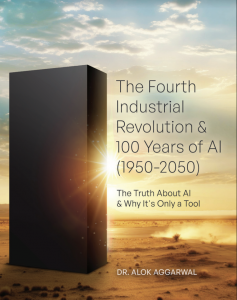Maintaining accuracy of Artificial Intelligence systems – and the high financial costs of doing so – represents a key obstacle to widespread implementation
SAN JOSE, CALIFORNIA, USA, April 1, 2024 /EINPresswire.com/ -- The fourteenth chapter of Alok Aggarwal’s new book, "The Fourth Industrial Revolution & 100 Years of AI (1950-2050), examines the complex landscape of AI system maintenance, focusing on the recurring need for updates and the impact on associated costs. The chapter titled, “Maintaining and Improving the Accuracy of AI Systems”, discusses the CACE principle ("changes anything, changes everything") that asserts that unlike traditional software, an AI system demands meticulous attention and frequent rebuilding of almost all of it.
Key takeaways from this chapter include:
• Reasons why AI systems fail: Most AI-systems fail because of the following six limitations: (a) brittleness of AI models, i.e., deterioration in accuracy with small perturbations, (b) inability to quantify certainty and providing most answers with more than 99% confidence, (c) lack of common sense particularly related to spatial or temporal context, (d) bias in data or lack of it, e.g., lack of people’s pictures with small eyes, (e) lack of interpretability as to why and where AI systems are likely to go wrong, and (f) selective amnesia.
• Data and the definition of the use case often change with time: Everything changes with time. So does data and even the definition of the underlying use case. Because of the six above-mentioned constraints, both changes in data (“data drift”) and in the use case (“concept drift”) force AI professionals to repeatedly execute the entire labelling, feature engineering, training, and knowledge engineering pipeline, which is often referred to as AIOps.
• Annual maintenance cost for AIOps is enormous: More precisely, this cost is likely to range between 45% and 80% of the original cost of developing and initially deploying an AI system. Mainly because of this reason, 46% of all AI projects have never been operationalized, and 76% companies barely broke even with their AI systems. Since the annual maintenance costs for AI systems are gigantic, from a commercial perspective, AI systems are unlikely to go mainstream during the next 2-4 years.
• Constituents of AIOPs: AIOps is an arduous process that consists of five subprocesses, namely, (a) DataOps that require about 75% of the overall time and cost, (b) ModelOps that require about 10% of the overall time and cost, (c) MLDevOps that require about 5% of the overall time and cost, (d) KnowledgeOps that require about 5% of the overall time and cost, and (e) GovernanceOps that also require about 5% of the overall time and cost. Each of these subprocesses has several laborious steps, most of which require subject matter expertise and cannot be automated, at least for now.
• Better return on investment for applications that use the same datasets and governance: Since DataOps and GovernanceOps constitute about 80% of the total cost of building and maintaining an AI system, use cases and applications that use similar datasets with similar DataOps and GovernanceOps are likely to yield better return on investment. Also, since these applications are likely to be similar, the subject matter experts and ultimate users may also be the same and get excited once the first AI-based use case begins to provide value.
• Organizations need to understand the ongoing costs related to AIOps: AI systems will become pervasive but only after various organizations (including for-profit, not-for-profit, and others) understand the on-going cost implications. Similarly, startup and investment communities (e.g., entrepreneurs, private equity groups, venture capital groups, equity research, and investment banking) would need to devise new valuation methodologies for AI firms that may be substantially different from that for traditional software firms. On the other hand, research shows that firms who have successfully operationalized AI systems witnessed 3% to 15% profit margin increases, which will be quite lucrative as these AI systems become pervasive.
• Four techniques are actively being pursued to mitigate limitations of AI systems and improve them: Researchers are investigating four techniques – active learning, transfer learning, federated learning, and meta learning – to reduce time and costs related to training models and to achieve more accurate models. Although these techniques are still nascent, they are likely to yield good results in 5-7 years.
Overall, the book, “The Fourth Industrial Revolution & 100 Years of AI (1950-2050)” provides a concise yet comprehensive exploration of AI, covering its origins, evolutionary trajectory, and its potential ubiquity during the next 27 years. Beginning with an introduction to the fundamental concepts of AI, subsequent chapters delve into its transformative journey with an in-depth analysis of achievements of AI, with a special focus on the potential for job loss and gain. The latter portions of the book examine the limitations of AI, the pivotal role of data in enabling accurate AI systems, and the concept of "good" AI systems. It concludes by contemplating the future of AI, addressing the limitations of classical computing, and exploring alternative technologies (such as Quantum. Photonics, Graphene, and Neuromorphic computing) for ongoing advancements in the field. This book is now available in bookstores and online retailers in Kindle, paperback, and hard cover formats.
About the Author: Dr. Aggarwal is the founder, CEO, and Chief Data Scientist of Scry AI, which provides innovative AI-based products, solutions, and services to enterprises across the globe. Before starting Scry AI, he co-founded Evalueserve (www.evalueserve.com) which provides research and analytics services worldwide. He received his Ph. D. from Johns Hopkins University and worked at IBM’s T. J. Watson Research Center during 1984 and 2000. He has written more than 120 research articles and has been granted eight patents. For more information, please visit: www.scryai.com
Alok Aggarwal
Scry AI, Inc.
+1 9149804717
email us here
Visit us on social media:
Facebook
Twitter
LinkedIn
Instagram
YouTube
![]()


